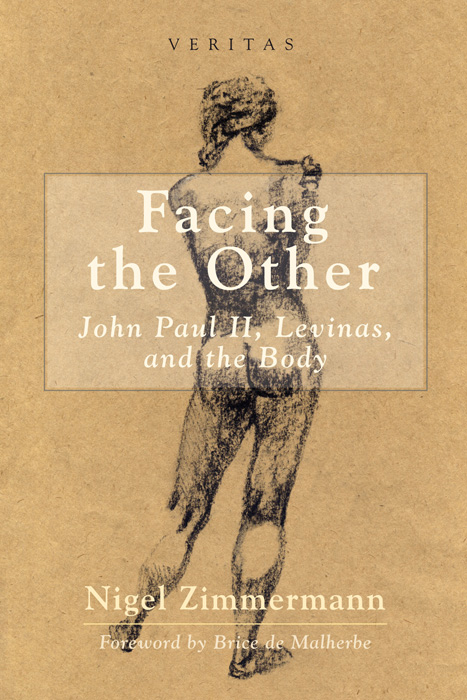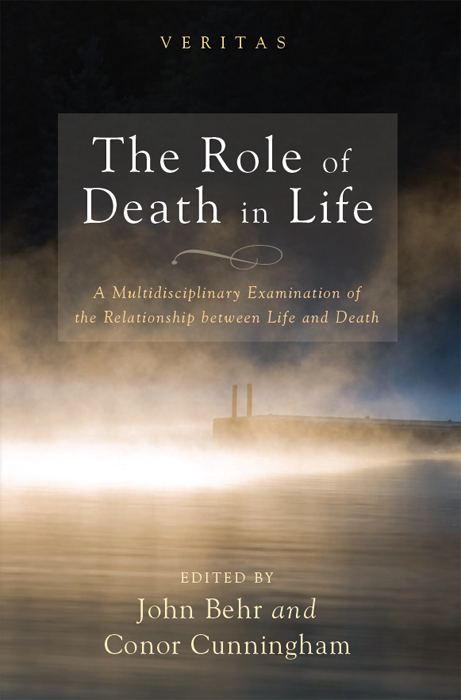 We have three books to announce in the Veritas series: one just published, and two forthcoming edited collections. The first is: Facing the Other: John Paul II, Levinas, and the Body, by Nigel Zimmermann, with a foreword by Brice de Malherbe. Download a promotional flyer for this book here [PDF].
We have three books to announce in the Veritas series: one just published, and two forthcoming edited collections. The first is: Facing the Other: John Paul II, Levinas, and the Body, by Nigel Zimmermann, with a foreword by Brice de Malherbe. Download a promotional flyer for this book here [PDF].
[Purchase from: Wipf & Stock | Amazon.com | Amazon.co.uk]
Publication description:
What is the significance of the body? What might phenomenology contribute to a theological account of the body? And what is gained by prolonging the overlooked dialogue between St. John Paul II and Emmanuel Levinas? Nigel Zimmermann answers these questions through the agreements and the tensions between two of the most important thinkers of the twentieth century. John Paul II, the Polish pope, philosopher, and theologian, and Emmanuel Levinas, the French-Jewish philosopher of Lithuanian heritage, were provocative thinkers who courageously faced and challenged the assumptions of their age. Both held the human person in high regard and did their thinking with constant reference to God and to theological language. Zimmermann does not shirk from the challenges of each thinker and does not hide their differences. However, he shows how they bequeath a legacy regarding the body that we would overlook at significant ethical peril. We are called, Zimmermann argues, to face the other. In this moment God refuses a banal marginalization and our call to responsibility for the other person is issued in their disarming vulnerability. In the body, philosophy, theology, and ethics converge to call us to glory, even in the paradox of lowly suffering.
Endorsements:
“Zimmermann’s work uncovers and articulately discloses moments of sincere dialogue between two influential figures of twentieth-century philosophical thought: John Paul II and Emmanuel Levinas. These moments are exploited for what they give to a contemporary theology of the body, without in any way ignoring points of significant difference.” — Michael Purcell, (1956-2013), Senior Lecturer in Systematic Theology, University of Edinburgh
“Karol Wojtyla and Emmanuel Levinas, obviously two of the great thinkers of the twentieth century, each profoundly original and deeply immersed in his own distinctive tradition, were yet able to meet in fruitful conversation on central questions about human nature and destiny, as Nigel Zimmermann shows in this lucidly and elegantly argued account.” — Fergus Kerr, Honorary Fellow, School of Divinity, University of Edinburgh
“Facing the Other . . . draws out the significance of the difference between a religious tradition whose God is wholly other, and the Christian claim that God became incarnate. Along the way, Zimmermann offers the reader a ‘theology of the body for grown-ups’ as he explains the centrality of the nuptial mystery and its Trinitarian foundations in the thought of Wojtyła/John Paul II. The work is beautifully crafted.” — Tracey Rowland, Dean and Permanent Fellow in Political Philosophy and Continental Theology, John Paul II Institute, Melbourne, Australia
Download a promotional flyer of Facing the Other here [PDF].
Also now available:
 The Role of Death in Life: A Multidisciplinary Examination of the Relationship between Life and Death, edited by John Behr and Conor Cunningham.
The Role of Death in Life: A Multidisciplinary Examination of the Relationship between Life and Death, edited by John Behr and Conor Cunningham.
[Purchase from: Wipf & Stock | Amazon.com | Amazon.co.uk]
Book description:
The relation between life and death is a subject of perennial relevance for all human beings, and indeed, the whole world and the entire universe, in as much as, according to the saying of ancient Greek philosophy, all things that come into being pass away. Yet it is also a topic of increasing complexity, for life and death now appear to be more intertwined than previously or commonly thought. Moreover the relation between life and death is also one of increasing urgency, as through the twin phenomena of an increase in longevity unprecedented in human history and the rendering of death, dying, and the dead person all but invisible, people living in the industrialized and post-industrialized Western world of today have lost touch with the reality of death. This radically new situation, and predicament, has implications—medical, ethical, economic, philosophical, and, not least, theological—that have barely begun to be addressed. This volume gathers together essays by a distinguished and diverse group of scientists, theologians, philosophers, and health practitioners, originally presented in a symposium sponsored by the John Templeton Foundation.
Contents:
I: Perspectives from Astronomy, Chemistry, and Biology
1: Made of Star-stuff: The Origin of the Chemical Elements in Life
—Alex Filippenko
2: A Biochemical Perspective on the Origin of Life and Death
—Luc Jaeger
II: Perspective from Anthropology
3: Immortality
—Douglas Davies
III: Perspectives from Philosophy
4: Suffering Death
—Emmanuel Falque
5: How Do We Become Fully Alive? The Role of Death in Henry’s Phenomenology of Life
—Christina Gschwandtner
IV: Perspectives from Theology
6: Life and Death in an Age of Martyrdom
—John Behr
7: New Life as Life out of Death: Sharing in the “Exchange of Natures” in the Person of Christ
—Henry Novello
8: Is There Life before Death?
—Conor Cunningham
V: Perspectives from Medicine and Bioethics
9: The Kenosis of the Dying: An Invitation to Healing
—Daniel Hinshaw
10: On Medical Corpses and Resurrected Bodies
—Jeffrey Bishop
Endorsements:
“In this book, the mutual implication of death and life is demonstrated from an astronomical level, in the emergence of human life from the death of stars, to the molecular level where death enables the emergence of cellular life, through anthropological, philosophical, and theological insights, to the realm of medical care for the dying, where it is claimed that ‘only theology can save medicine.’ A profound and challenging book.” — Andrew Louth, Professor Emeritus of Patristic and Byzantine Studies, Durham University, United Kingdom
“How can Christians defend the place of natural death and the death consequent upon sin, whilst continuing to insist upon the undying character of true life as such and so the reality of resurrection? These penetrating essays by several of the leading theological thinkers of our times will powerfully help the reader to ponder these crucial matters of our contemporary mortality.” — John Milbank, Research Professor and Director of the Centre of Theology and Philosophy University of Nottingham
“For once, it is not a polite exaggeration to say this is a ‘unique’ book. The breadth of disciplines represented and the originality of the analysis offered make it an exceptional contribution to current debates. Anyone who thinks the dialogue between theology and the natural sciences is, at best, an exchange of uncomprehending platitudes, will have to think again in the face of these expert, challenging essays, which show that an orthodox theology of our embodied condition can be culturally transformative.” — Rowan Williams,Master of Magdalene College, Cambridge
“A substantive, important, and provocative volume. The insights of the essays it encompasses will richly reward the reader.” — H. Tristram Engelhardt Jr., Professor of Philosophy, Rice University, Professor Emeritus, Baylor College of Medicine
[Purchase from: Wipf & Stock | Amazon.com | Amazon.co.uk]
Forthcoming in the Veritas series:
The Resounding Soul: Reflections on the Metaphysics and Vivacity of the Human Person, edited by Eric Austin Lee and Samuel Kimbriel.
Description:
It is surely not coincidental that the term “soul” should mean not only the center of a creature’s life and consciousness but also a thing or action characterized by intense vivacity (“that bike’s got soul!”). It also seems far from coincidental that the same contemporary academic discussions that have largely cast aside the language of “soul” in their quest to define the character of human mental life should themselves be so—how to say it?—bloodless, so lacking in soul. This volume arises from the opposite premise, namely that the task of understanding human nature is bound up with and in important respects dependent upon the more critical task of learning to be fully human, of learning to have soul. The papers collected here are derived from a Summer 2013 conference in Oxford (itself a vivacious event) sponsored by the Centre of Theology and Philosophy and together explore the often surprising landscape that emerges when human consciousness is approached from this angle. Drawing upon literary, philosophical, theological, historical, and even musical modes of analysis, the essays of this volume vividly remind the reader of the power of the ancient language of soul over against contemporary impulses to reduce, fragment, and overly determine human selfhood.
[Endorsements, cover image, and order information forthcoming.]








Discussion
Comments are turned off.
Comments are closed.